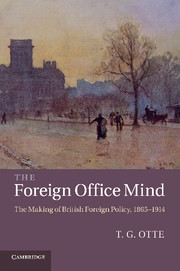Book contents
- Frontmatter
- Contents
- Illustrations (to be found between pages 146 and 147)
- Preface and acknowledgements
- List of abbreviations
- Introduction
- 1 Illusions of supremacy
- 2 The problems of isolation
- 3 Problems of consolidation
- 4 Two Eastern Questions
- 5 The transformation of Great Power politics
- 6 The end of an era
- Conclusion
- Select bibliography
- Index
- Plate section
- References
2 - The problems of isolation
the ‘Foreign Office mind’, 1874–1885
Published online by Cambridge University Press: 07 October 2011
- Frontmatter
- Contents
- Illustrations (to be found between pages 146 and 147)
- Preface and acknowledgements
- List of abbreviations
- Introduction
- 1 Illusions of supremacy
- 2 The problems of isolation
- 3 Problems of consolidation
- 4 Two Eastern Questions
- 5 The transformation of Great Power politics
- 6 The end of an era
- Conclusion
- Select bibliography
- Index
- Plate section
- References
Summary
The decade after 1874 saw the dispersal of any illusions of a British ascendancy. Already the fate of the so-called Khiva convention had demonstrated the difficulties of managing relations with Russia in Asia. The growth of Russian power, indeed, was one of the chief problems for British diplomacy. How to counter Russia’s growing assertiveness, and how to contain the spread of her influence, preoccupied the high-Victorian ‘Foreign Office mind’. The continued dislocation of the balance of power in continental Europe, moreover, added to the problem. The two developments would combine in the ‘Great Eastern crisis’, the most acute crisis of British foreign policy since the Crimean War. Adapting to the altered strategic landscape of Great Power politics in the 1870s meant grappling with objective realities. The emergence of an alternative foreign policy under the banner of Gladstonian liberalism, however, also posed a conceptual challenge for the diplomatic élite, one that was to test established party loyalties.
‘Livadian parasites’ and others: the diplomatic élite in the mid-1870s
From the late 1870s onwards, there was a considerable churning of Britain’s diplomatic personnel. The ‘block’ on promotions that had blighted the careers of so many middle-ranking diplomats previously was gradually dislodged by a combination of a generational transition and external pressures. The ascendancy of the high-Victorians over the service was now complete. In turn, these changes affected the internal conversation within the diplomatic élite. There was, however, an additional factor, which shaped the dynamics of that conversation in equal measure, Lord Lyons’ now somewhat anomalous position. For much of the first half of the nineteenth century, the Paris embassy had been the key diplomatic posting abroad, reflecting France’s position as Britain’s main potential ally on the continent as well as her principal rival elsewhere. Lord Cowley’s appointment to Paris in 1852 was recognition of both his pre-eminence within the diplomatic service and the political importance of France. In the same manner, the decision to send Lyons to Paris in 1867 was made on the strength of the latter’s superior professional claims, founded on the skill he had shown at his two previous postings to Washington and Constantinople. Once installed in the Rue du Faubourg St. Honoré, Lyons did not confine himself to commenting on Anglo-French matters, but offered reflections on wider European affairs, just as Cowley had done, and as befitted Britain’s leading diplomat. However, vanquished in 1870, and riven by internal feuds since, France had lost much of her political significance – and so had the Paris embassy.
- Type
- Chapter
- Information
- The Foreign Office MindThe Making of British Foreign Policy, 1865–1914, pp. 80 - 149Publisher: Cambridge University PressPrint publication year: 2011



